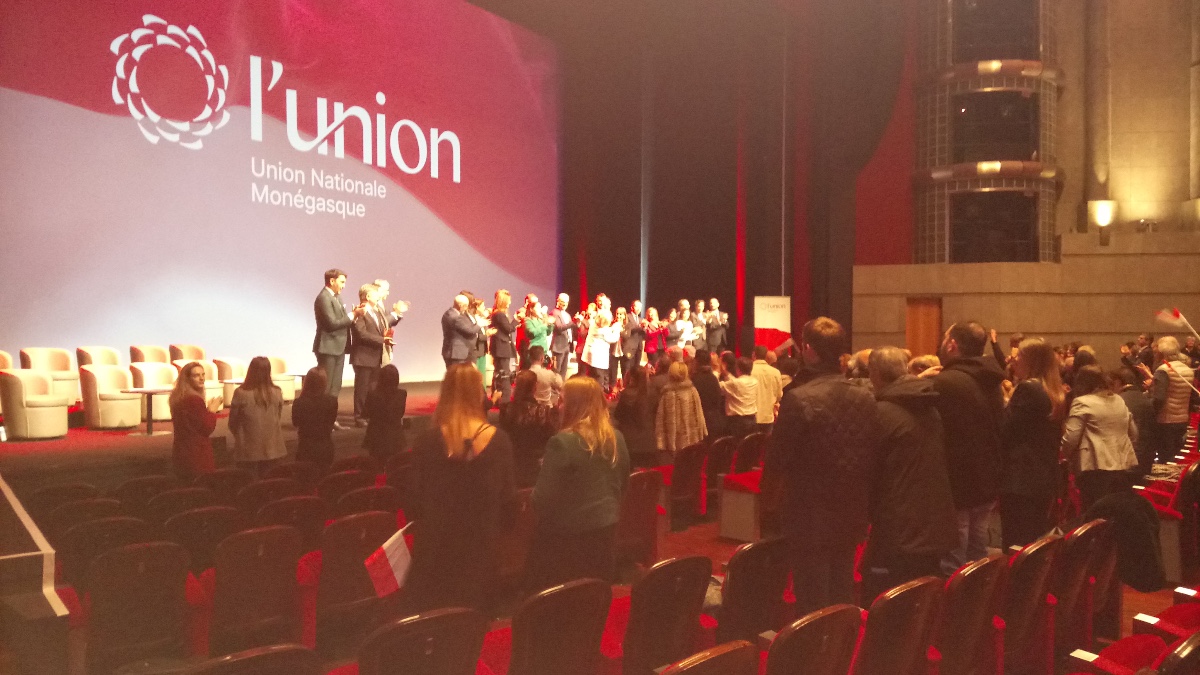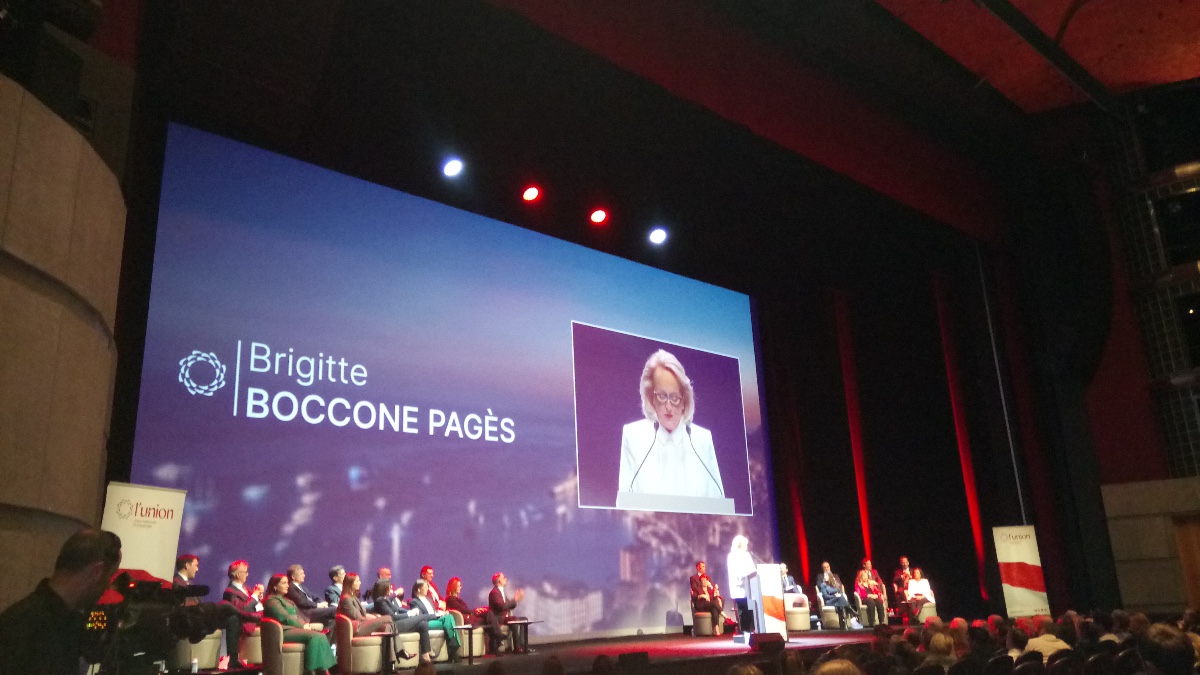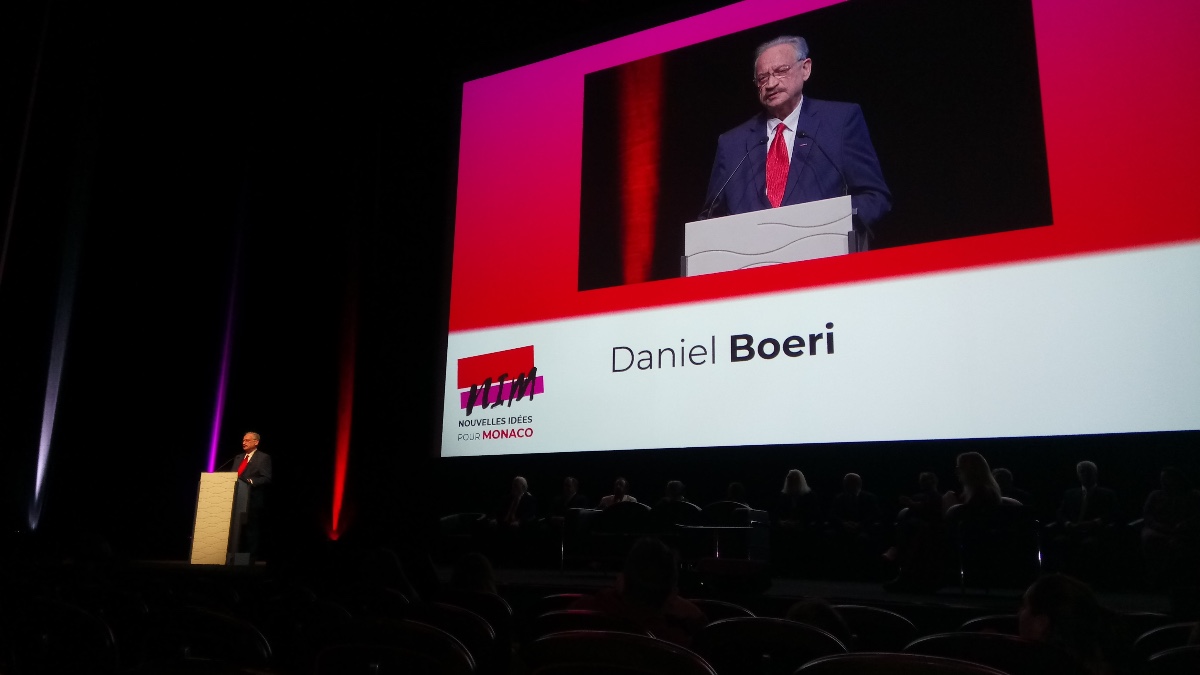By Félicitas Guillot (IE-EI, Nice)
On February 5th, national elections were held in Monaco. The campaign started officially the 14th of October 2022 with the presentation of one list, a list of of national alliance : l’UNM – l’Union Nationale Monégasque. This alliance relates to representants of three lists of the previous elections in 2018 – l’Union Monégasque (Monegasque Union – centre), Horizon Monaco (centre-right) and Primo! (Priority Monaco! centre-left).
In 2018, Primo! won twenty-one out of twenty-four seats in the National Council. The leaders of the two other movements each gained one seat. Horizon Monaco obtained a second seat. During the health crisis, those three movements got closer, which resulted in a succesful and independant policy in response to COVID-19. To the sanitary crisis succeeded the crisis in Ukraine. Facing those challenges, monegasque political life is more and more consensus-driven. To understand the reason for this, it is important to deepen the construction process of political life in Monaco.
Institutional evolution
In the early XXth Century, the evolution of ideas gradually lead to the institutional evolution. Such as France at the beginning of last century, the Principality had to deal with local discontent. Causes for dissatisfaction lied for most nationals in rudimentary education, low standards of living, a sense of being deprived of any influence on the conduct of local affairs.
The reforms demanded, organizational ones, such as the assembly right and the freedom of the press, were gradually established. In 1910, the Prince introduced the most fundamental rights and also the universal suffrage for the nomination of the members of the Municipal Council.
It was followed by the first elections, held in 1910 on the municipal level. Despite the elections, the population remained dissatisfied with their circumstances. The rights obtained existed only on paper and offered no real influence on matters that were important to them. In response to those grievances, the Prince granted a Constitution on the 5th of January 1911. The National Council was introduced by this text. This charter did not go over well.
The debate around this Constitution and the real political power enabling ordinary citizens to influence political decisions continued until 1962, the year of the new Constitution. During the second half of the 20th Century, Monegasque politics were mainly concentrated on the economic expansion of the Principality, particularly under the guidance of Prince Rainier III and Jean-Charles Rey, and its presence on the international level. The latter point is very important. This international presence contributed to Monaco being considered as a real State and to be more independent from France.
Pact between the Sovereign and His people
From the first request of more civil rights in 1909 till nowadays, the opinion of both, the people and the Sovereign, matters. They result in bilateral negotiations. This harmonious collaboration or narrow association is possible thanks to the small number of Monegasques. It is substantially a protection against external pressures. For example, the French-Monegasque crisis of the 1960s made it possible to put an end to a period of tension between the Sovereign and His people and allowed it to accelerate the process of promulgation of the Constitution of December 17th, 1962, symbol of modernity and sovereignty of the Principality.
Political movements
As for the Monegasque political life, generally, the movements and later “ parties ” are near the center of politics. Some extremes have developed after Second World War (Nationalists) and in the 60s (Communists). Politics are mainly based on consensus. The Monegasque consensus is closely linked to the spirit of moderation and based on a common will to reach an agreement in the sense of the general interest and on a desire of confrontation of people, of ideas, but no ideologies. That is why, in Monaco, there are no real cleavages. Voters and Candidates are more like a big family.
The Monegasque political movements differ from parties of the nearby countries. These are associations, in the sense of civil law, gathered around general themes. They distinguish themselves by the respective sensibility of their leaders and their members and not by partisan ideologies.
Legislative power
Legislative power is jointly exercised by the Prince and the Monegasque Parliament, the National Council (Conseil National), an unicameral assembly. Today it is composed of twenty-four members, elected by universal and direct suffrage for a period of five years. The elections consist of a one round mixed system : plurinominal ballot by majority vote and proportional representation.
National Counsellors also have non-parliamentary jobs. Their mandate is not compatible with the functions of members of the princely house, nor of Government Counsellor-Minister. The National Councellors are permitted to resign their mandate. Each year, the National Council elects its president and vice-president, as well as the committees (for example, the External Relations Committee) and delegation members.
The National Council votes on the State Budget (preliminary and amending) and approves treaties and the ratification of international agreements. The National Council also votes on »legislative » and « government » bills and can propose amendments that have a direct link to areas of policy. The Constitution can be amended by mutual agreement between the Prince and the National Council. The Prince communicates with the National Council through messages read by the Minister of State. The Sovereign has the power to dissolve the National Council after having requested the Crown Council (His seven-member advisory committee) opinion – which is non-binding.
Despite recommendations made by international organizations in the last couple of decades, none of the main political actors, nor a majority of the Monegasque population, seems to favour establishing a parliamentary monarchy. It can be easily explained by one of the most important peculiarities of Monaco : the Monegasques are a minority in their own country (9.571 ‘Monégasques’ – 38.350 inhabitants = 24,96 %). This argument explains that the non-Monegasques have no voting right and that the Monegasques are so much attached to their peculiarities. In fact, their protection allowed and will allow the survival of the Principality.
Opening to the world
From the “ threatening ” presence of large neighbours till more recent challenges caused by the European integration, Monaco has successfully managed its independence and its modernization. As described, the Monegasque political life was essentially dominated, until 1962, by the pursuit of a more liberal Constitution. Nevertheless, from the 1950s, other thoughts, such as those on the extension of the territory at sea and the economic development, emerged. Further to new tensions with France at the end of 1990s, the Principality aspired to a greater independence with regard to its larger neighbour and, in particular, initiates the process of membership to the Council of Europe. This process had, naturally, an impact on institutions, as well at the national level as at the municipal level.
By means of the constitutional revision of 2002, changes took place to be in conformity with the recommendations emitted in the reports of the Council of Europe. It allowed in particular to extend the participation of the National Council in the field of the foreign policy. The number of National Counsellors was increased from eighteen to twenty-four.
The modification of the voting system, by means of the Law of April 9th, 2002, concerns exclusively the national elections. It consists of combining the previous election system, majority voting for two thirds of the seats and a proportional representation for the last third. These measures impose the constitution of lists containing a number of candidates equal or upper to the figure of the absolute majority, that is thirteen members. This inclusion of proportionality leaves some space to the representatives of the other lists in the National Council. Nevertheless, it is a mixed voting system with very strong majority effect.
National elections since the constitutional revision of 2002
The first national elections after these modifications, those of 2003, marked a big change concerning the Monegasque political life. The opposition, the Union For Monaco (UPM, centre-left)), was elected with twenty-one seats and ended the “ reign ” of the Democratic National Union (UND, centre-right), in position since 1963. The new political leader, Stéphane Valeri, introduced a partisan politics. It was also the beginning of a “ professionalization ” of the political life. First satisfaction questionnaires were born, the Monegasque political movements increased their presence on the Internet, the political meetings were equipped with modern tools and pre- and post-election communication occupies an increasingly important place.
In 2008, l’UPM won again with twenty-one seats. Three seats will be occupied by Rassemblement et Enjeux pour Monaco (REM), successor of the Democratic National Union. The third « party », an union of three independent movements (PFM, Synergie Monégasque and Non-Inscrits Monégasques) with well-known political personalities such as R. Giordano, C. Boisson and D. Boeri, who have paid the price through the modification of the voting system. ; they didn’t get any seats in the National Council.
Three “ parties ” were represented since the elections of February 10th, 2013: Horizon Monaco (successor of REM), Monagasque Union (successor of UPM), Renaissance. The presence of this last movement was particularly interesting, because it represented exclusively the interests of the SBM (Société des Bains de Mers) ; it is considered as a corporatist party. Horizon Monaco won the elections with twenty seats. Its leader, Laurent Nouvion, was elected as president. The opposition, l’Union Monégasque, won three seats and Renaissance one.
In February 2018, the following political « parties » ran the parliamentary election : Horizon Monaco (centre-right), Priorité Monaco ! (centre-left) and Monegasque Union (centre), including the movement Renaissance. It is the first time that a woman is chief candidate (Béatrice Fresko-Rolfo/Horizon Monaco). Primo !, a new political movement with a well-known chief candidate, Stéphane Valeri, won the election. The leaders of the other movements gained each one seat (B. Fresko-Rolfo and J.-L. Grinda). Horizon Monaco obtained a second seat (J. Rit).
Context of the national elections of 2023
As mentioned before, the campaign started officially the 14th of October 2022 with the presentation of one list with 24 members, a list of of national alliance : l’UNM – l’Union Nationale Monégasque. On November 14th a first meeting (Ré-Union) was held. The chief candidate of l’Union is Brigitte Boccone Pagès, first woman president of the National Council. As vice-president, she succeeded to Stéphane Valeri when appointed to a key position at the SBM in December 2022.
But, informally, the campaign started in July 2022, when Daniel Boeri left the majority group (Primo!) of the National Council. He revived NIM – Non-Inscits Monegasques – a political movement already present at the national elections of 2008. A first General Assembly took place the 14th of September 2022. NIM is then described as a political think tank on the major issues for Monaco over the next 10 years and for the future generations. NIM managed – at the last moment – to reunite fourteen members to create a second list for the election. NIM was renamed « Nouvelles Idées pour Monaco » (New Ideas for Monaco).
NIM presents itself as progressive. They would like to ensure a people-centred approach. L’Union represents all political views, from centre-left, centre to centre-right. For both parties the general interest prevails, and especially the protection of their economic and social model.
Both movements are looking to the future, and thus towards youth. NIM with «Notre Futur Aujourd’Hui» (Our Future Today). And l’Union with « Monaco demain » (Monaco Tomorrow). They wish to allow the future generations to live and to work in Monaco.
Another important issue has been highlighted by B. Boccone Pagès. She and some running mates referred to the place of the National Council relative to the government. They request coordination and mutual respect, transparency and fairness.
Electoral Outcome
The results of the elections were announced in the night of 5 to 6 February, around one o’clock. Faced with an abstention record – voter turnout was around 57,3 % – and an important number of blank or spoilt ballot papers, the tension was palpable almost till the end. Finally, the full list of l’Union was elected.
Conclusion
Just as in 2018, the main general themes were the process of accession to the European Union and the preservation of national specificities. They are linked and, of course, very important because the Monegasque community constitutes a minority in their own country ! This fact explains why the negotiation with the European Union raises question and remains an important electoral campaign topic.
Monaco’s political history underscores how important it is to keep their national particularities. This has proved essential for the Principality to survive in a world that continues to change very quickly.
The following sentence of Christophe Brico, UNM candidate for the national elections of 2023, synthesizes very well the spirit of the latest elections : « L’Union est pour moi une évidence, que je résumerai ainsi : les Monégasques et le pays sont les seules boussoles qui comptent , pas les étiquettes, ni les clans.» (The Union is obvious to me, which I would resume this way : the Monegasque and the country are the only compasses that count ; there is neither space for labels nor for clans.)
Already in the past, political dissensus were set aside in the time of crisis, as for example during World War II or in the Nineteen Sixties.
Generally, when confronted with major crises, there is not or little place for a politics of fundamental opposition. Nowadays new challenges arise. There are no borders anymore, regardless of the area : environment, public health, terrorism and so on. In that context, consensus politics seems to be an appropriate solution.
And Monaco, in a sense, constitutes a laboratory for this kind of solution. It has become in most fields, in accordance with the wishes of His Serene Highness Prince Albert II, « une société modèle, un modèle de société » (a model society, a model of society).




